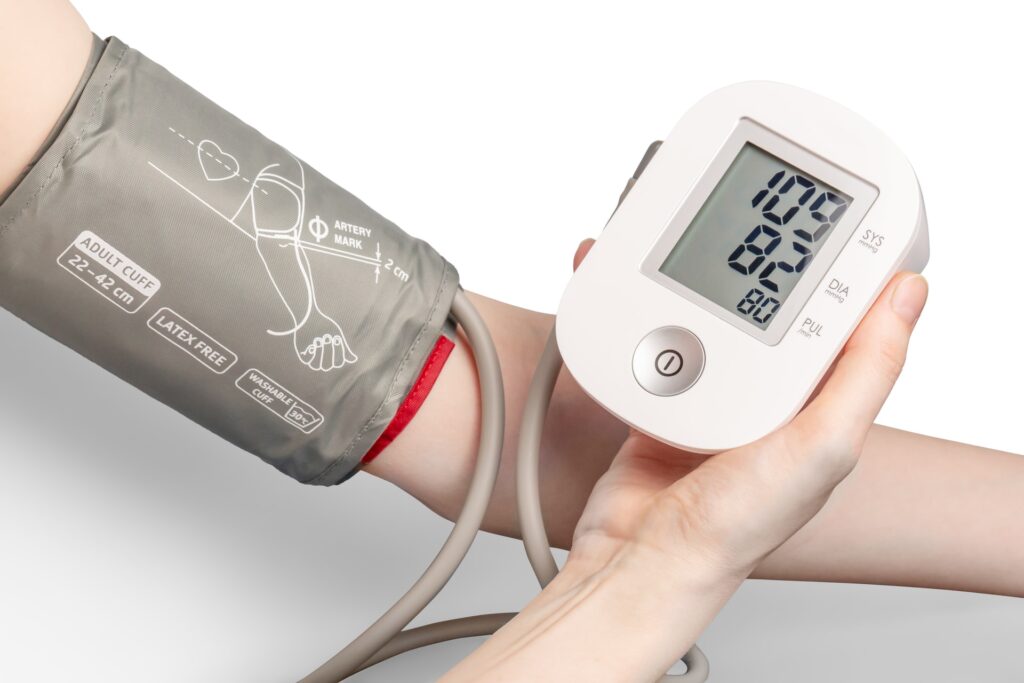Hypertension guidelines
The aim of nutritional therapy in hypertension treatment is to provide foods that are generally considered as healthy, exclude foods that are generally considered unhealthy, limit intake of certain nutrients that can have blood pressure raising properties and increase intake of nutrients that have blood lowering or normalising properties. According to medically reviewed information posted on Healthline.com(1,2), an example approach in the treatment of hypertension could include:
- Limiting sodium intake to 2300mg a day, which is equivalent to 1 teaspoon of salt daily. Apart from limiting the intake of salt on its own, foods such as bread and rolls, pizza, sandwiches, cold cuts and cured meats, soups, burritos and tacos should be avoided.
- Limiting the intake of processed deli and lunch meats as they are often also high in salt
- Limiting the intake of pickles as salt is used to preserve the food from decaying, therefore such foods would be high in salt as well
- Limiting the consumption of canned soups and tomato products as they are also usually high in salt
- Limiting the intake of sugar to 6 teaspoons (25g) a day for females and 9 teaspoons (36g) a day for males as a study(3) suggests that decreasing the consumption of sugar positively influenced blood pressure levels
- Limiting the intake of processed foods containing saturated and trans fats as they are linked to increase in LDL cholesterol and heart disease, stroke and type 2 diabetes(4,5)
- Avoiding alcohol as its excess consumption is linked to increased blood pressure and prevents blood pressure medications from working effectively it is also a potential cause of obesity(which is a factor for hypertension itself) and can interact with blood pressure-lowering medication(6,7)
- Inclusion of citrus fruits as they may have a blood pressure lowering effects and are dense in micronutrients and other plant compounds that keep the heart healthy through reduction of risk factors for high blood pressure(8)
- Inclusion of oily fish in the diet due to their high omega-3 fatty acids content is linked to a healthy heart and may prevent inflammation through decreasing levels of blood vessel constricting compounds called oxylipins(8)
- Increasing the intake of Swiss chard and other foods that are high in magnesium (e.g. beans, lentils, amaranth, pistachios) and potassium, can help regulate blood pressure
- Inclusion of berries in the diet as they contain anthocyanins that are shown to increase nitric oxide levels in the blood and reduce the production of blood vessel constricting molecules(9)
- Inclusion of fresh tomatoes that contain lycopene and are linked to reduced risks of vascular diseases(10)
- Adding herbs and spices such as celery seeds, cilantro, saffron, lemongrass, black cumin, ginseng, cinnamon, cardamom, sweet basil, ginger and many others as they contain compounds that may help regulate blood pressure(11)
- Increasing the consumption of beets, beet greens and beet juice that contain nitrates, which relax the blood vessels and thus reduce the blood pressure
- Increasing the intake of spinach, which is also high in nitrates and also in antioxidants, potassium and magnesium
- Using olive oil for cooking as it contains anti-inflammatory polyphenols that may help fight high blood pressure
Hypertension treatment
The list is not exclusive and to summarise. nutritional therapy typically reduces blood pressure through exclusion and limitation of foods that are linked to hypertension (such as trans and saturated fats, excess sodium, simple sugars, processed foods and alcohol) and inclusion of foods that are high in nutrients that may normalise or lower the blood pressure, such as potassium, magnesium, antioxidants, nitrates, polyphenols and many others. Such dietary interventions are considered to be effective by science and are often incorporated to fight chronically elevated blood pressure in clinical conditions(12).
References:
- Jillian Kubala, The 17 Best Foods for High Blood Pressure, accessed on 13/05/21, available at: https://www.healthline.com/nutrition/foods-high-blood-pressure
- Kimberly Holland, Eating with High Blood Pressure: Food and Drinks to Avoid, accessed on 13/05/21, available at: https://www.healthline.com/health/high-blood-pressure-hypertension/foods-to-avoid
- Safiyah Mansoori et. al.(2019), Added Sugar Intake is Associated with Blood Pressure in Older Females, Nutrients
- Sally Chiu et. al.(2017), Effects of a very high saturated fat diet on LDL particles in adults with atherogenic dyslipidemia: A randomized controlled trial, PLoS One, available at: https://www.ncbi.nlm.nih.gov/pmc/articles/PMC5293238/
- Masaru Sakurai et. al.(2011), Relationship of Dietary Cholesterol to Blood Pressure: The INTERMAP Study, HHS Author Manuscripts, available at: https://www.ncbi.nlm.nih.gov/pmc/articles/PMC3075799/
- Ian B Puddey & Lawrence J Beilin(2006), Alcohol is bad for blood pressure, available at: https://pubmed.ncbi.nlm.nih.gov/16922819/
- Alice E Holton at. al.(2017), Consensus validation of the POSAMINO (POtentially Serious Alcohol–Medication Interactions in Older adults) criteria, BMJ Open, available at: https://www.ncbi.nlm.nih.gov/pmc/articles/PMC5695415/
- Andrew Feyh et. al.(2016), Role of Dietary Components in Modulating Hypertension, HHS Author Manuscripts, available at: https://www.ncbi.nlm.nih.gov/pmc/articles/PMC4857880/
- Stefano Vendrame & Dorothy Klimis-Zacas(2019), Potential Factors Influencing the Effects of Anthocyanins on Blood Pressure Regulation in Humans: A Review, Nutrients, available at: https://www.ncbi.nlm.nih.gov/pmc/articles/PMC6628116/
- Ho Ming Cheng et. al.(2017), Tomato and lycopene supplementation and cardiovascular risk factors: A systematic review and meta-analysis, available at: https://www.atherosclerosis-journal.com/article/S0021-9150(17)30010-2/fulltext
- Kate S Driscoll et. al.(2019), Effects of herbs and spices on blood pressure: a systematic literature review of randomised controlled trials, available at: https://pubmed.ncbi.nlm.nih.gov/30817445/
- Hawkins C Gay et. al.(2016), Effects of Different Dietary Interventions on Blood Pressure: Systematic Review and Meta-Analysis of Randomized Controlled Trials, available at: https://pubmed.ncbi.nlm.nih.gov/26902492/




